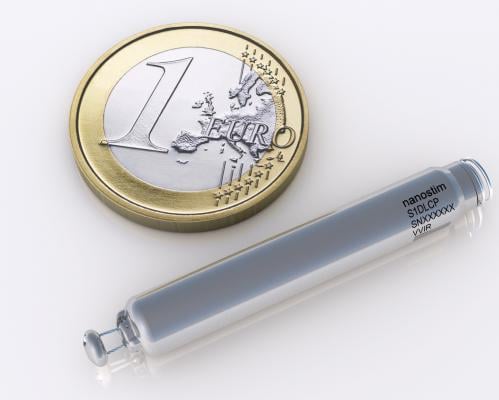
March 18, 2014 — St. Jude Medical Inc. announced the first enrollments in the company’s LEADLESS Pacemaker Observational Study evaluating the Nanostim leadless pacing technology. The Nanostim pacemaker received CE marking in 2013, and post-approval implants have occurred in the United Kingdom, Germany, Italy, Czech Republic, France, Spain and the Netherlands.
The LEADLESS Pacemaker Observational Study is a prospective, multi-center, post-market clinical study designed to build additional evidence to support the safety profile of the Nanostim leadless pacemaker in patients indicated for ventricular single chamber pacing. It will provide long-term data about the Nanostim leadless pacemaker and will seek to demonstrate additional information about the long-term performance of the device. The trial will enroll approximately 1,000 patients in approximately 100 centers in Europe.
Nanostim is designed to be implanted directly into the heart via a non-surgical procedure. The device is designed to be placed without the visible surgical pocket, scar and insulated wires required for conventional pacemakers. Implanted via the femoral vein with a steerable catheter, the device is designed to be fully retrievable so that it can be readily repositioned throughout the implant procedure and later retrieved if necessary.
The Nanostim leadless pacemaker is less than 10 percent the size of a conventional pacemaker. The small size of the device and lack of a surgical pocket, coupled with the exclusion of a lead, improves patient comfort and can reduce traditional pacemaker complications, including device pocket-related infection and lead failure. The device battery is expected to have an average lifespan of more than nine years at 100 percent pacing, or more than 13 years at 50 percent pacing.
The elimination of the visible lump and scar at a conventional pacemaker’s implant site, in addition to the removal of patient activity restrictions that may prevent the dislodgement or damage to a conventional lead, will potentially improve the quality of life for patients with this technology by allowing most to continue living active, uninhibited lifestyles. The device is supported by the St. Jude Medical Merlin Programmer, which is also used to interrogate and program the company’s other pacemakers and implantable cardioverter defibrillators (ICDs).
Initial results from the LEADLESS study were presented last year and demonstrated overall device performance comparable to conventional pacemakers. Total implant procedure times averaged 28 minutes.
The first U.S. implant in the LEADLESS II pivotal trial, designed to evaluate the Nanostim leadless pacemaker for U.S. Food and Drug Administration (FDA) approval, took place in February 2014. The trial is being conducted under an Investigational Device Exemption (IDE) from the FDA, and will enroll approximately 670 patients at up to 60 centers worldwide with up to 50 sites in the U.S.
For more information: sjm.com


 January 05, 2026
January 05, 2026 









